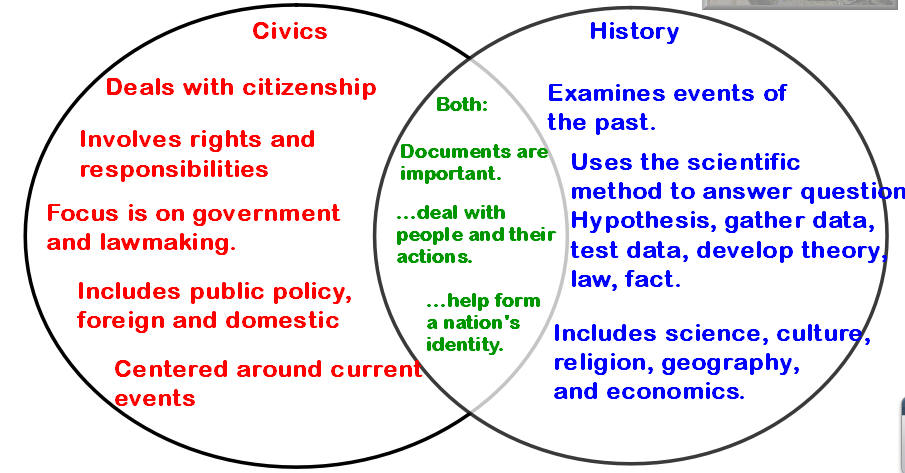
Lesson Plan: Civics vs. History
Date: September 11, 2010
Objectives: The students will
I. Identify the characteristics of Civics and compare them with the study of
History.
II. Examine the Gettysburg Address for examples of Civics-History relationship.
III. Identify how the Gettysburg Address supported the systems of democratic
government and the federal system.
This lesson is based an a promethean board flipchart created by the webmaster.
Warm Up Activity (Anticipatory Set): Defining Terms
A) Distribute the worksheet entitled Civics vs. History: What's The
Difference?
B) Have students brainstorm the definitions for Civics and
History. Students should write their definitions on their worksheets.
Main Activity: Venn Diagram and Analysis
A) Have students discuss and answer the question: "How are these disciplines
similar and different?"
B) Have students place differences in the circles and similarities in the overlapping section of the Venn diagram.
C) Possible answers include but are not limited to:

Examples (Modeling):
A) Have students form five groups. assign each group one of the ideas or events
listed on the worksheet.
B) Allow students 3-5 minutes to identify the situation as either Civics or History or both and describe why they classified their problem the may they did.
C) Have groups report their answers. After one minute of discussion for each, display the suggested answer.
D) Have students complete the worksheet as the answer to each problem is
revealed. Answers may include:|
|
The president is commander- in-chief of the US Armed Forces |
Article II of the Constitution makes the president leader of the armed forces. |
The president has led the US through wars from Washington to Obama, from the early 1800s to Afghanistan and Iraq. |
|
The process whereby aliens become citizens is called naturalization. |
Naturalization is the process of becoming a US Citizen from immigration to taking the oath of allegiance. |
Immigrants have helped form a diverse nation much like a "salad bowl" rather than a melting pot. Ellis Island was the starting point for many. |
| The debate continues regarding US troop strength in Afghanistan. |
Congress and the President decide on funding and strategy for winning the war in Afghanistan. |
The level of US military strength in Afghanistan was increased after the end of combat in Iraq. |
| Women and minority groups use their right to protest to achieve equal rights. |
Rights and freedoms are protected by the 1st Am. of the Constitution.
|
1920: Women's suffrage. 1963: March on Wash. 1964: Civil Rights Act.
|
|
Opposing groups have taken sides over the issue of building a mosque near the site of the 9/11 terror attacks in NY. |
Groups have the right to protest and to free exercise of religion. |
Anti-Muslim feelings after 9/11 have led to an increase in hate crimes against Muslims. Americans must protect the rights of minority groups.
|
Guided Practice: The Gettysburg Address
A) Distribute “Civics and History: The Gettysburg Address” to students.
B) Read the speech out loud to students using The Illustrated Gettysburg Address by Michael McCurdy.
C) Have students interpret the images based on their knowledge of the Civil
War and the speech itself.
E) Have students write Civics concepts that they can identify in the margin on
the right next to the words of the speech on the left.
Include definitions if needed.
Wrap-Up Activity (Closure):
A) Instruct students to access TV news, newspaper, magazine or news website.
Have them print, cut out or write about a current news story
that deals with government, politics, or foreign policy. have students write a
one-paragraph research summary that describes the history of
their subject matter.
B) Have students share their topics and their analysis of the historical
background they found for their topic.
Homework (Independent Practice):
Evaluation: The lesson will be evaluated by:
I. the accuracy of student's written responses;
II. student's scores on future tests and quizzes.